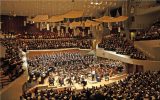An electrifying classic! Year after year, this concept continues to captivate the singers of the world: 1300 lovers of vocal music from many different countries come together in the Berlin Philharmonie to learn a symphonic choral work with Rundfunkchor Berlin and then perform it in concert.
Singing along with 1300 people in the Berlin Philharmonie
These big Sing-Along Concerts in the Philharmonie are intoxicating celebrations of ensemble singing in which you can let yourself be carried along on the surge of a gigantic chorus. What makes the annual Sing-Along Concert so special is that amateurs get to rehearse and sing regularly with a professional chorus under professional working conditions. Since the 1990s, the Radio Chorus has launched a range of initiatives to connect the vast community of amateur singers with the professionals. It also aims to attract and instil an enthusiasm for choral singing in individuals who would otherwise have no access to classical music. These initiatives have found a permanent form in the Sing-Along Concert, whose reputation has spread far beyond Berlin, even beyond Germany. In 2010, for the first time, the successful model was exported – to the Roman theatre of Aspendos in Turkey. Since then it has also taken place in Budapest and Vienna.








